Key takeaways:
- Career balance is about integrating work and life to fuel passions while maintaining energy, rather than simply dividing time between them.
- Identifying personal values and goals is crucial for making empowered decisions and aligning career choices with what truly matters to you.
- Setting boundaries, such as limiting work hours and practicing self-care, is essential for maintaining well-being and productivity.
- Continuous evaluation and adjustment of career goals and workload help ensure alignment with personal aspirations and foster a healthier work-life dynamic.
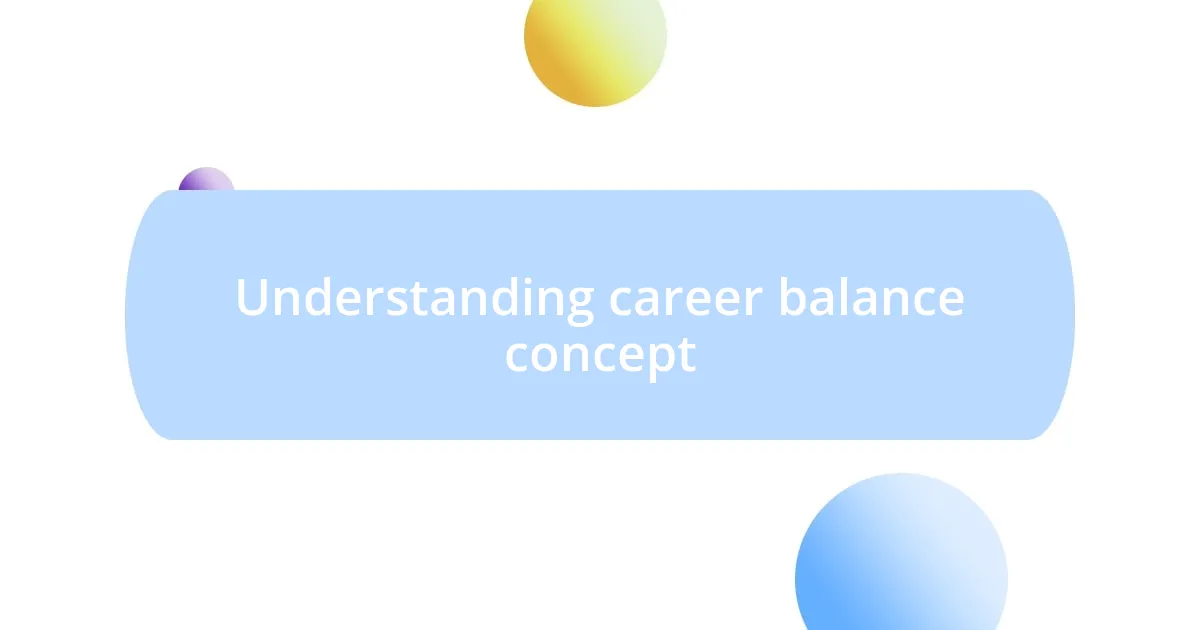
Understanding career balance concept
When I first heard the term “career balance,” it struck me as something elusive—like trying to catch smoke with my bare hands. I would often wear myself thin chasing after professional success, believing it was the only pathway to fulfillment. But that relentless pursuit left me feeling depleted and questioning whether I was actually moving forward in my career.
What I gradually realized is that career balance isn’t simply about dividing time between work and life; it’s about integrating both in a way that fuels your passions without draining your energy. I remember one hectic week where I clocked endless hours at the office to hit a deadline, only to come home and realize I had missed out on a family gathering. That night, I grappled with a tough question: was the stress and sacrifice truly worth it if it meant missing moments that matter?
As I reflected, I learned that balance is not a one-size-fits-all concept. It’s fluid and can shift based on our circumstances and values. I found that small adjustments—like setting boundaries on work hours or carving out time for hobbies—made a significant difference. So, I ask you: what small change can you make today to prioritize your well-being while still thriving in your career?
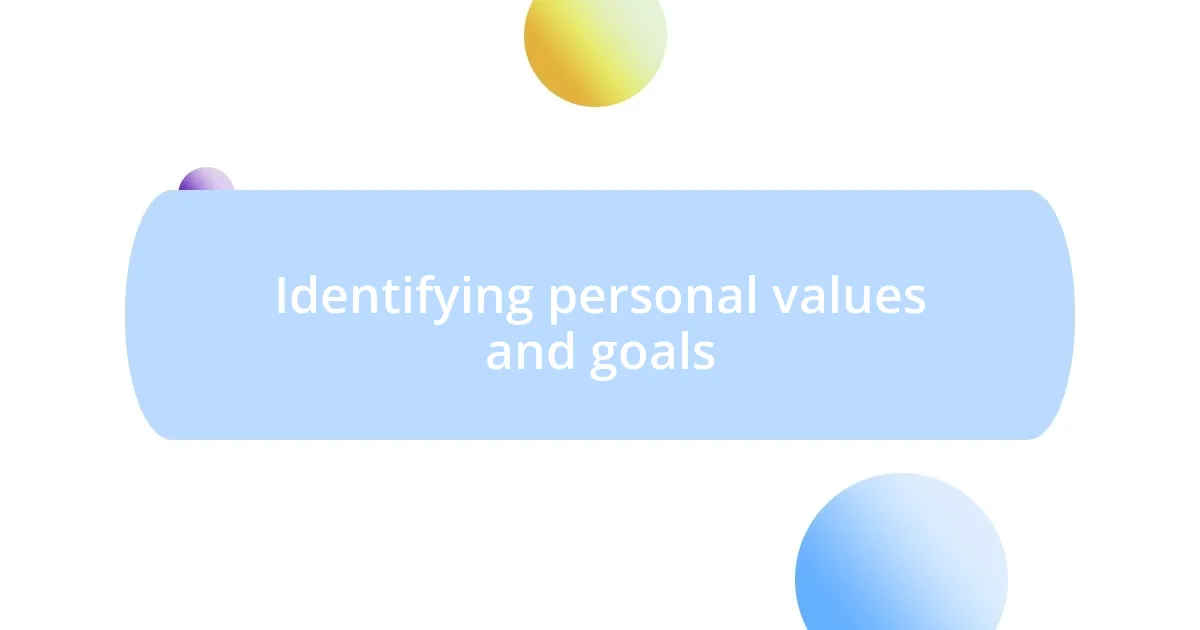
Identifying personal values and goals
When I began my journey towards career balance, identifying my personal values and goals felt fundamental. I recall sitting with a notebook, reflecting on what truly mattered to me—family, creativity, and personal growth. By aligning my professional goals with these values, I noticed a profound shift in my motivation and satisfaction at work.
Understanding and articulating my values helped me make crucial decisions about the projects I would take on. For example, I turned down a lucrative opportunity that clashed with my commitment to my family. It wasn’t easy, but standing firm on my values made me feel empowered. Ultimately, recognizing what I wanted out of my career—not just what was offered—radically transformed my approach.
In my experience, this process isn’t just about listing values; it involves frequently revisiting them. Life changes, and so do our priorities. I once found myself reassessing my goals during a major life event, which prompted me to prioritize flexibility in my work schedule. This ongoing self-reflection keeps me grounded and connected to what I really want, making each career decision more aligned with my core self.
| Personal Values | Career Goals |
|---|---|
| Family | To integrate work-life balance into my daily routine |
| Creativity | To pursue projects that ignite passion and innovation |
| Personal Growth | To seek continual learning opportunities |
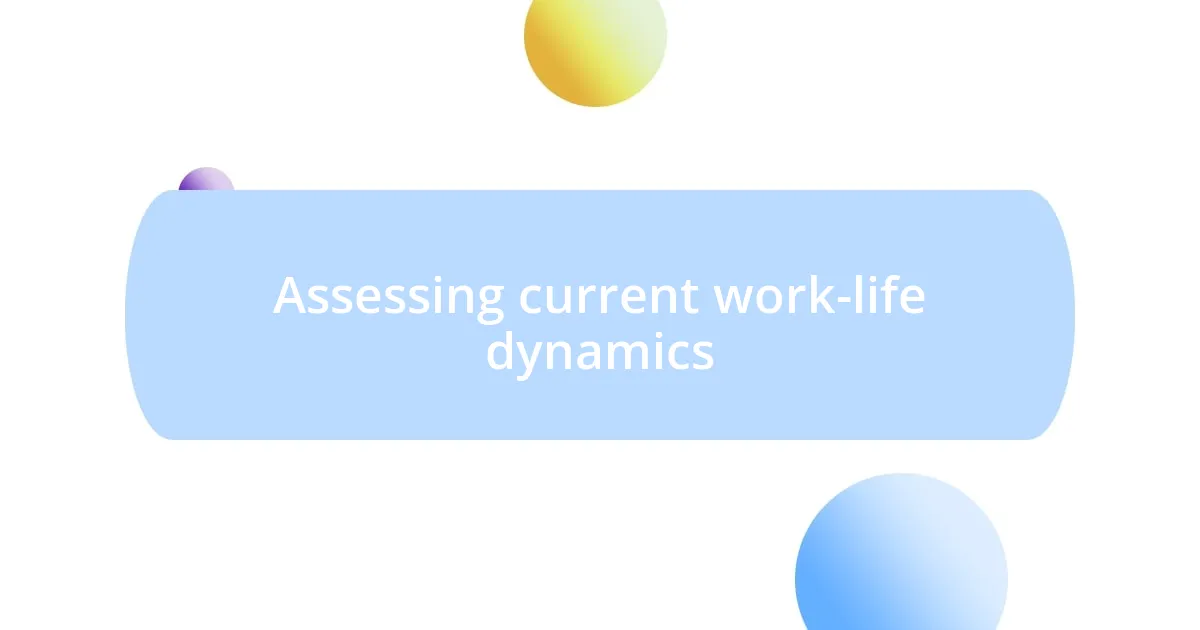
Assessing current work-life dynamics
Assessing my current work-life dynamics required a deep dive into my daily routines and emotional well-being. One particularly telling moment arose when I found myself working late into the night, feeling accomplished about meeting deadlines but simultaneously realizing how isolated I felt from my friends. In that chaos, I began tracking my time, and it became eye-opening to see just how unbalanced my commitments were—hours spent at my desk versus the fleeting moments I spent with loved ones.
To effectively assess your own work-life dynamics, consider the following steps:
- Reflect on Daily Activities: Keep a journal for a week to note how you spend your time—work, family, relaxation.
- Evaluate Emotional States: After different activities, jot down how you felt; was it drained, fulfilled, or distracted?
- Identify Time Thieves: What consumes your time but provides little satisfaction? It might be mindless scrolling on social media or pointless meetings.
- Set Clear Priorities: Choose what truly matters to you—work accomplishments, family dinners, or personal time—and make an effort to protect these moments.
- Seek Feedback: Discuss your work-life dynamics with trusted colleagues or friends to gain perspective on your situation and potential areas for improvement.
In my case, making even minor adjustments became a game-changer. I vividly remember the first time I stepped away from my computer at a reasonable hour, feeling that mix of anxiety and relief. That evening, I joined my family for dinner, and I realized that professional success felt hollow without the presence of the people I cherish. Balancing these dynamics was about more than work; it became crucial for my mental health.
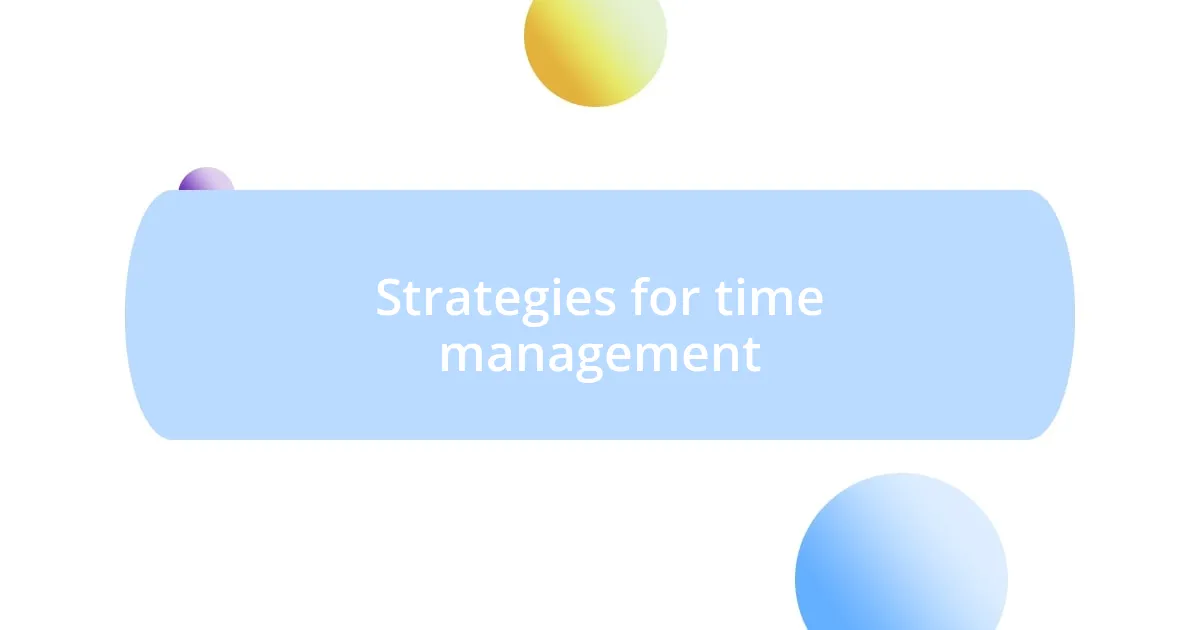
Strategies for time management
Finding effective time management strategies has been a transformative part of my career journey. One approach that really worked for me was setting clear boundaries, especially around my work hours. I remember a time when I felt compelled to answer work emails late at night, convinced that it would impress my boss. However, that often left me feeling drained the next day. Now, making it a point to unplug after a certain hour has not only improved my rest but has also boosted my productivity during the day.
Another key strategy has been the use of time-blocking. I started scheduling my day into specific sections for tasks—like meetings, focused work, and even breaks. I was skeptical at first. Could this really keep me on track? But, surprisingly, once I stuck to the schedule, I realized how much more I accomplished in shorter bursts. The moments dedicated to deep focus, without distractions, genuinely felt rewarding.
Reflecting on my priorities is also crucial. During hectic times, I ask myself, “What’s the most important task for today?” This simple question has helped me align my efforts with my goals. One Friday, when deadlines were looming, I chose to wrap up a project instead of diving into laundry or personal errands. That choice gave me a sense of accomplishment, knowing I had prioritized effectively. If you’re feeling overwhelmed, consider giving this a try. It might just help you find clarity in your day-to-day chaos.
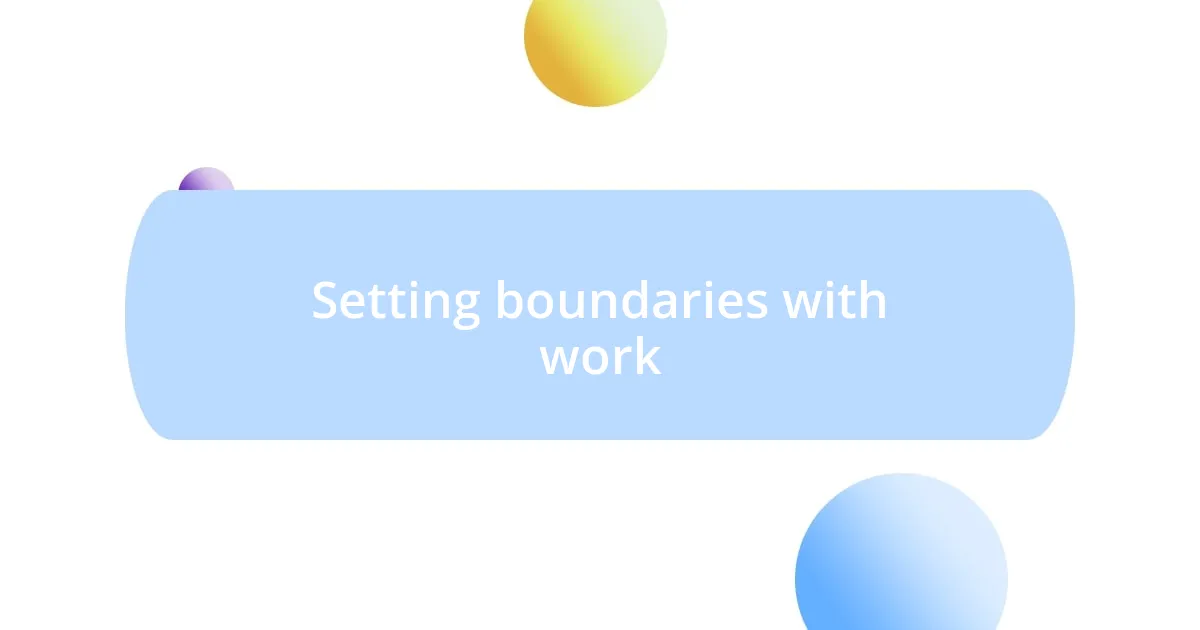
Setting boundaries with work
I’ve learned that setting boundaries with work is crucial for personal well-being. I still recall a time when I agreed to take on an additional project just to please my manager, thinking it would boost my standing in the office. Instead, I found myself working late into the night, feeling increasingly resentful and burnt out. It became clear to me that saying “no” was just as important as saying “yes” to opportunities; I had to protect my mental space.
Another practice I’ve adopted is clearly defining my work hours. I decided to communicate these boundaries to my team, making it known that I wouldn’t respond to emails after 6 PM. Initially, it felt a bit awkward to enforce this change. Would my colleagues think I wasn’t dedicated? But to my surprise, not only did my productivity improve, but I also gained respect from my peers who admired my commitment to balance. It was a win-win—my work got better, and I finally had evenings to spend on hobbies and with my family.
In my experience, self-care isn’t selfish; it’s necessary. I remember one Sunday, I set aside a few hours for myself instead of checking work emails or preparing for the week ahead. As I indulged in a good book and a cup of tea, I felt an exhilarating sense of freedom. It made me realize that carving out “me time” helps me bring my best self to work. So, I ask you: how often do you prioritize your own needs amidst the hustle? I encourage you to make that space; the clarity it brings can be truly liberating.
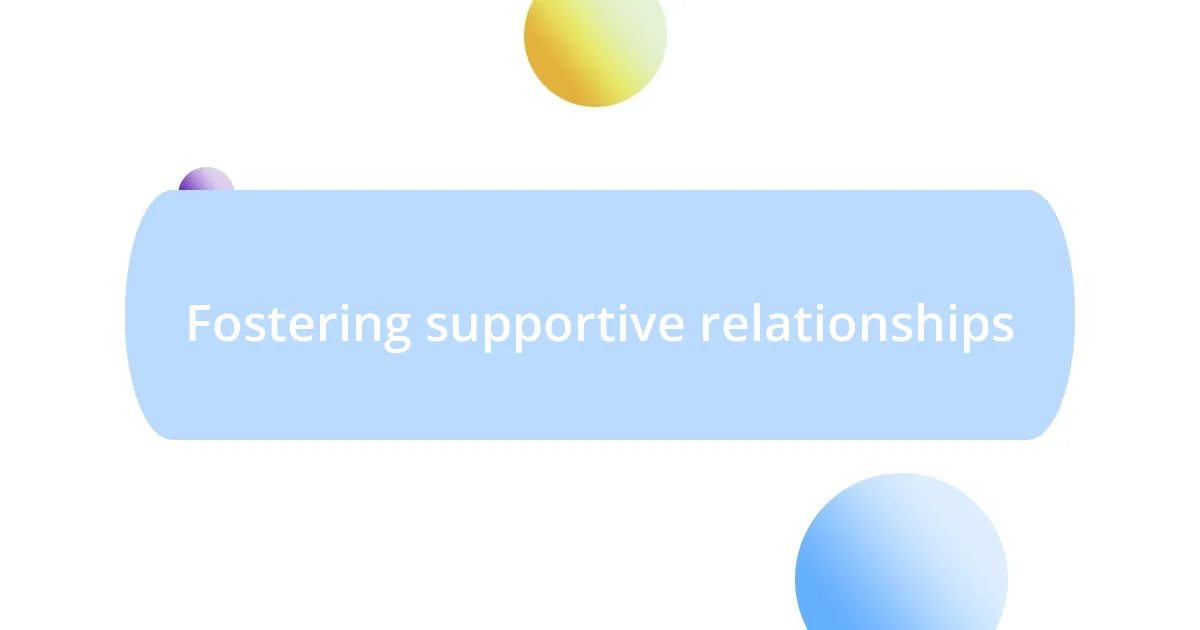
Fostering supportive relationships
Building supportive relationships in the workplace has been a game-changer for me. I vividly recall a time when I felt overwhelmed by a challenging project. Instead of tackling it alone, I reached out to a colleague who had experience in that area. Collaborating not only made the workload lighter, but it also fostered a sense of camaraderie that enhanced our workplace environment. Have you ever considered how sharing challenges can strengthen bonds?
Over time, I realized the power of mentorship in fostering support. I found a mentor who guided me through difficult decisions, sharing insights from their own career journey. That connection not only provided me with invaluable knowledge but also instilled a sense of confidence in my capabilities. I often reflect on the importance of seeking guidance—who in your circle could offer wisdom during a pivotal moment?
Also, celebrating each other’s successes is something I’ve embraced wholeheartedly. I remember the rush of excitement when a teammate landed a major client. Instead of feeling jealous, I made it a point to acknowledge their hard work and achievements. In doing so, I fostered an environment where support flourished. When was the last time you cheered for someone else? Cultivating supportive relationships is a two-way street, and it brings so much joy and positivity into our professional lives.
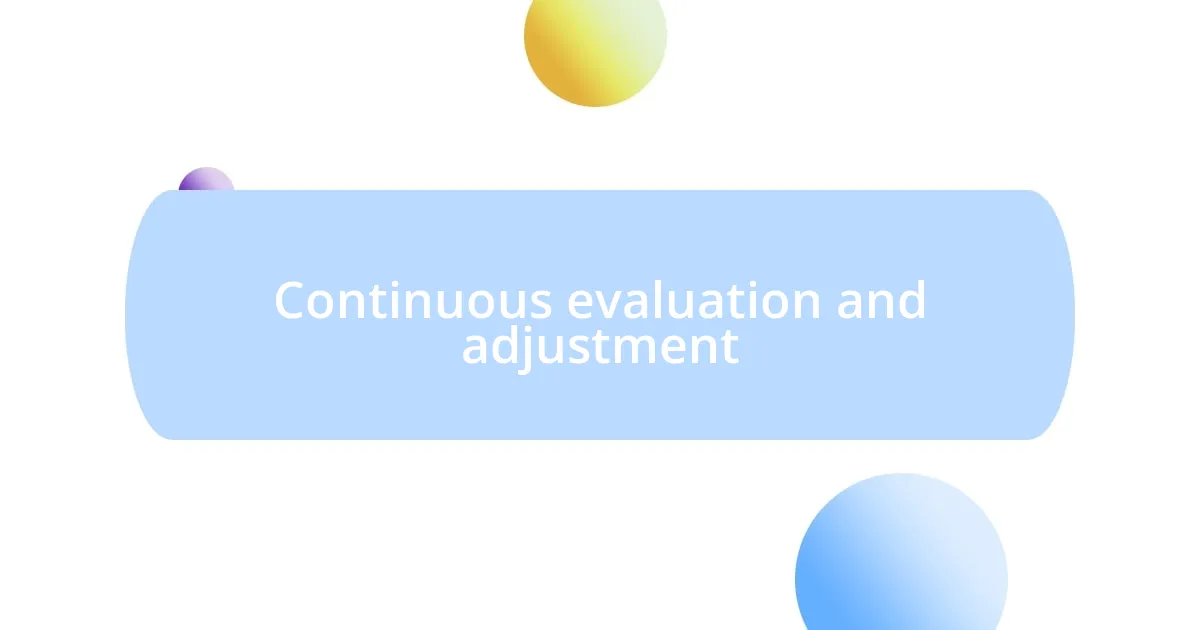
Continuous evaluation and adjustment
Continuously evaluating my career has become a vital practice for me, akin to a regular health check-up. After a few months at a new job, I took a moment to reflect on my workload and stress levels. I discovered that certain projects were draining my energy and not aligning with my long-term goals. So, I set aside time weekly to reconsider what I was doing—was it fulfilling? Did it add value? This simple check-in not only eased my stress but helped me steer my career in a direction that felt right.
Adjusting my approach isn’t always easy, though. I remember a time when I was juggling multiple tasks that left me feeling frantic and overwhelmed. Rather than pushing through, I learned to assess and prioritize. This meant shedding some responsibilities, even if it felt uncomfortable at first. That’s when I realized—why do we often cling to tasks that don’t serve us? Embracing the flexibility to pivot has allowed me to focus on what truly matters, ultimately fostering a more balanced professional life.
One of the most profound lessons I’ve learned is the importance of feedback in this continuous cycle. In a recent performance review, my manager highlighted areas where I could improve. Initially, my instinct was to feel defensive, but I chose to view it as a golden opportunity. I asked myself, “What can I learn from this?” In seeking clarity and actionable insights, I crafted an adjustment plan for my daily routines. Have you ever thought about how feedback could help you reshape your career path? Embracing this mindset turned criticism into constructive fuel for growth in my professional journey.














